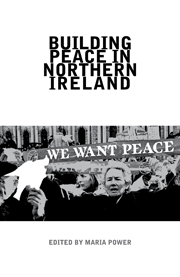Book contents
- Frontmatter
- Contents
- Acknowledgements
- Contributors
- 1 Introduction: Peacebuilding in Northern Ireland
- 2 Understanding the Role of Non-aligned Civil Society in Peacebuilding in Northern Ireland: Towards a Fresh Approach
- 3 The Role of Civil Society in Promoting Peace in Northern Ireland
- 4 The Contribution of Integrated Schools to Peacebuilding in Northern Ireland
- 5 Providing a Prophetic Voice? Churches and Peacebuilding, 1968–2005
- 6 ‘Peace Women’, Gender and Peacebuilding in Northern Ireland: From Reconciliation and Political Inclusion to Human Rights and Human Security
- 7 Encumbered by Data: Understanding Politically Motivated Former Prisoners and the Transition to Peace in Northern Ireland
- 8 Loyalism and Peacebuilding in the 2000s
- 9 Civil Society, the State and Conflict Transformation in the Nationalist Community
- 10 Examining the Peacebuilding Policy Framework of the Irish and British Governments
- 11 Building Peace and Crossing Borders: The North/South Dimension of Reconciliation
- 12 Peace Dividends: The Role of External Aid in Peacebuilding
- Index
6 - ‘Peace Women’, Gender and Peacebuilding in Northern Ireland: From Reconciliation and Political Inclusion to Human Rights and Human Security
- Frontmatter
- Contents
- Acknowledgements
- Contributors
- 1 Introduction: Peacebuilding in Northern Ireland
- 2 Understanding the Role of Non-aligned Civil Society in Peacebuilding in Northern Ireland: Towards a Fresh Approach
- 3 The Role of Civil Society in Promoting Peace in Northern Ireland
- 4 The Contribution of Integrated Schools to Peacebuilding in Northern Ireland
- 5 Providing a Prophetic Voice? Churches and Peacebuilding, 1968–2005
- 6 ‘Peace Women’, Gender and Peacebuilding in Northern Ireland: From Reconciliation and Political Inclusion to Human Rights and Human Security
- 7 Encumbered by Data: Understanding Politically Motivated Former Prisoners and the Transition to Peace in Northern Ireland
- 8 Loyalism and Peacebuilding in the 2000s
- 9 Civil Society, the State and Conflict Transformation in the Nationalist Community
- 10 Examining the Peacebuilding Policy Framework of the Irish and British Governments
- 11 Building Peace and Crossing Borders: The North/South Dimension of Reconciliation
- 12 Peace Dividends: The Role of External Aid in Peacebuilding
- Index
Summary
Peacebuilding, like peace, is a highly contested arena both ‘academically and politically’ due to its theoretical and value-laden qualities. Feminist scholars have long argued that ‘all scholarship has political commitments’; however, this is especially apparent in disciplines such as International Relations and Peace Studies. Traditional political approaches to peace processes tend to focus on state actors and reflect the status quo, which in turn excludes and undermines the role of the civic arena – where women's political engagement is usually most prevalent. Feminist and peace theorists have shared much in common on the topic of peacebuilding, but perhaps most explicitly in their expressed goals of social and political transformation. While there has been a growing recognition of the significance of grassroots people-to-people initiatives in building peace, peace studies scholarship has often ignored or misunderstood the critical role of gender – both in mainstream peace theories and peace processes. Contemporary feminist literature on peacebuilding and conflict is distinguished not only by a ‘political commitment to understanding the world from the viewpoints of marginalized peoples and actors’, but also by a complex, gender-based analysis of peace, security and conflict, attentive to ‘bottom-up’ processes. Is it possible that a ‘gender-blind’ approach to peace and conflict may even contribute to the global failure to achieve sustainable peace?
As the renowned historian Joan W. Scott has cogently argued, ‘Gender is a constitutive element of social relationships based on perceived differences between the sexes’ and ‘gender is a primary way of signifying relationships of power’.
- Type
- Chapter
- Information
- Building Peace in Northern Ireland , pp. 93 - 110Publisher: Liverpool University PressPrint publication year: 2011



